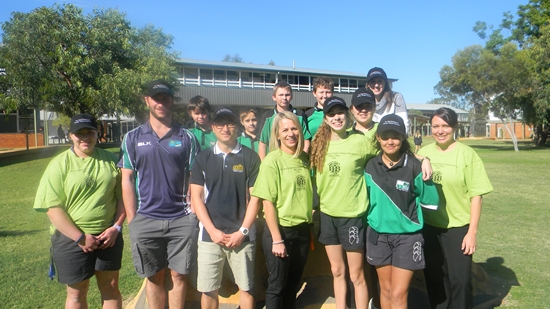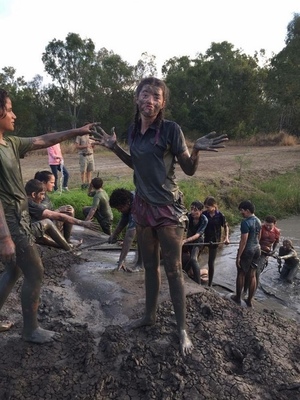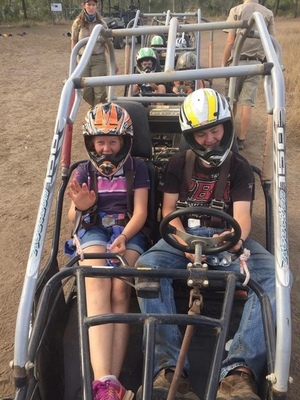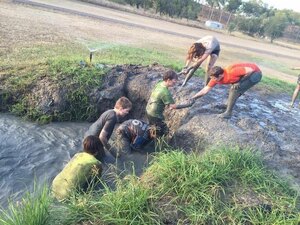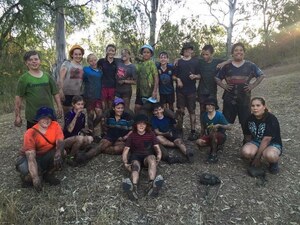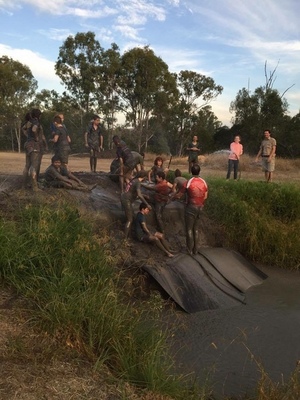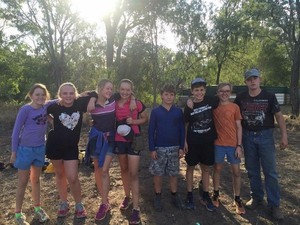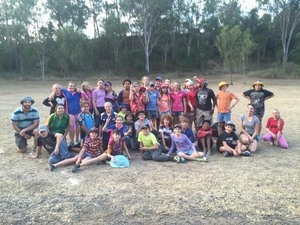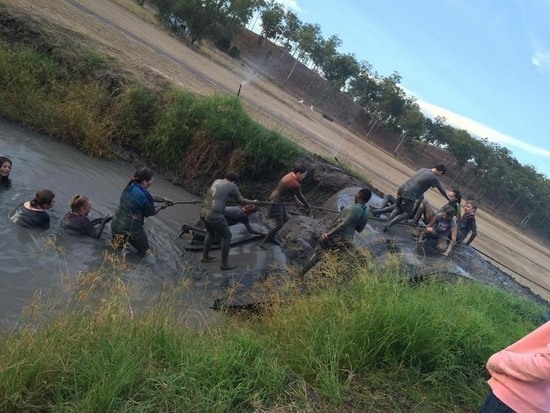2 June 2016
Newsletter Articles
- Principal's Report
- Teaching and Learning@ CSHS
- Tuesday Afternoon Study Club
- STUDENT SERVICES NEWS
- Positive Behaviour Learning (PBL)
- Japanese
- Some Tips For English
- Lending a helping hand for the CWAATSICH Senior Games
- Reading Corner
- Regional Cross Country
- Music education and language acquisition
- Charleville Mates Program
- Info from the GO
Principal's Report
Welcome to Edition Four of our newsletter for Term 2. It is hard to believe that at the end of this week we will have only three weeks left of the term. It is certainly at the point in the term when students need to ensure that they are putting their best efforts into their study to ensure that their results reflect the hard work that they have been putting in.
On assembly last week I spoke to the students about a famous quote from Leigh Matthews, ex-Brisbane Lions coach, that states, "It is to be then it is up to me." I think this is an apt quote for this time of the year because students can ensure that they can reach their goals by ensuring that they attend school every day, put efforts into their study and follow the 4Be's and 4V's which we affectionately know as the Charleville High Way.
Staffing
We would like to welcome Nadonna Schouten to our front office staff. Nadonna started with us last Monday and will be the smiling face that you see when you first come to the office.
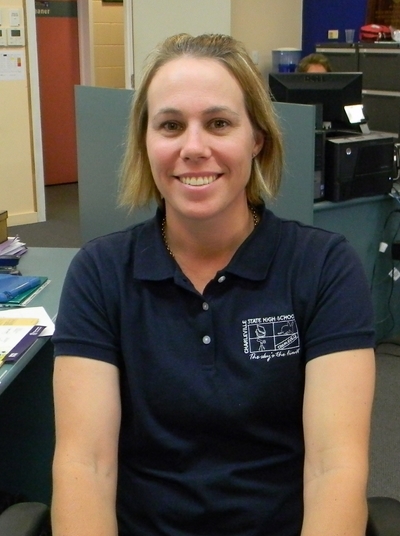
Reword
On the last couple of assemblies, I have been speaking to students about a great tool that they can download onto their laptops called Reword. Reword aims at reducing online bullying. It recognises derogatory words and phrases and then asks students to reconsider whether they want to continue to send the phrase or not. Statistics show that 80% of students reconsider sending these words or phrases. I encourage you to visit the reword website and to have a conversation with your student. Reword operates across all social media platforms. The website for Reword is:
http://reword.it/
Attendance
I would like to congratulate our Junior Secondary students who are averaging a very healthy 91.2% attendance rate at the moment. While this is still below our target, it shows that the Junior Secondary form classes are well placed to ensure that we can meet our target of 92% in the Junior Secondary form classes in the very near future. Unfortunately though, our Senior Secondary students' attendance rate is not as encouraging. Our Senior Secondary form classes are sitting at 88.3%. Students in the Senior Secondary school need to be at school each and every day to ensure that they are giving themselves the best opportunities to succeed and in turn reach their post-school career goals. I look forward to hopefully seeing an improvement in the Senior Secondary form classes in the coming weeks.
Quadrennial School Review (QSR) Process
As you are aware earlier in the year we had our school review. The executive summary is on our website if you haven't had the chance to have a look at this yet. The next step in this process is the compiling of our strategic plan which will drive the future direction of Charleville State High School over the next four years (2017 – 2020). This process is now underway at school and will require input from students and also parents and caregivers from our immediate school community. The Parents and Citizens Association will play a big part in providing this feedback which will help inform the strategic direction of the school. I look forward to sharing this plan with you in the coming months.
P and C Association
On behalf of the P and C president Julie Frousheger and the committee, I would like to invite you to attend the next meeting of the P and C which will be held on the 8th of June at 5.30 pm in the Administration Block.
Careers Market
On Tuesday, the 31st of May, our school held its biannual Careers Market. The Careers Market is a wonderful opportunity for our students to look at different options that may be available after school, and to make contacts with personnel from different organisations.
The Careers Market is importantly a district event, and it was great to be able to welcome students from the surrounding secondary schools. Thank you to Sue McDonald for her organisation and smooth running of this biannual event.
Fanfare
Our school band attended Fanfare in Roma on the 24th of May. I am pleased to announce that the students received a Bronze award in recognition of their enthusiasm and commitment to their performance. A big thank you to Mr. Sloan and Mr. Kwan, who have been holding regular rehearsals with the band. Fanfare is only the start of the music program revival in Charleville so keep your ears out for upcoming performances.
Facilities
The external painting of B Block is nearly complete. There is still some painting of some walkways to occur. The renewal of these buildings is certainly providing an attractive learning environment for our students. All painting will be finished by the end of the term.
It is important to us that every day, in every classroom, every student is learning and achieving. Charleville State High School thanks you for your support in this partnership.
Marcus
Teaching and Learning @ CSHS
What is coming up within the curriculum at CSHS?
Learning comes in all shapes and forms. At CSHS we continue to offer a range of experiences to students. As you can see from the following examples, our students are provided with many experiences.
Yr 12 Safe Driving Course: Our Year 12 students will be participating in a Safe Driving Course, run by Austrail Training Services, fully funded by Hand Heart Pocket charity. Students will participate in a three (3) hours theory session on June 1st, while those students with a learners licence will complete a three (3) practical session at the Showgrounds on Saturday June 4th.
This is an amazing opportunity provided to our students to help ensure the safety of all now and into the future, when behind the wheel.
Deadly Ways - Our Ways Indigenous Secondary School Student Mentoring Program: Our indigenous Year 10 students will begin the Our Ways Program, the second tier of the Deadly Ways Mentoring Program through USQ. Our Ways focuses at Year 10 and provides our students with important cultural knowledge for developing leadership abilities. Our Ways engages Elders, important Community Members and University students as mentors to help our students develop these skills and abilities.
How can all students help to achieve their best results and focus on the finer details?
- Attend school and classes regularly (must be a minimum of 92% - unexplained absences will incur 2 points per absence as a part of the SSAP, and possibly lead to a cancelation of the enrolment due to a lack of engagement with the educational processes provided and course coverage)
- Plan ahead - use the assessment dates and planner given out each semester to help organise your time for the rest of the term and map out when you will need to work on assessment
- Attempt all work, at school and home, set by staff
- Seek feedback and ask questions about all tasks – see your teachers before or after school, during lunch breaks or in class if there are opportunities to do so
- Submit full drafts when required
- Submit all tasks on time – including sitting exams and presenting oral tasks
- Talk to staff if there are any concerns well before the due date
- Attend study / homework club for further help (need to have submitted a permission form – collect one from Mr Kohli if you want to participate)
- Apply for an extension (at least a week before the due date) if there is evidence to support the application. See Mr Kohli, Head of Department Senior Schooling, if you need to request this option.
Tuesday Afternoon Study Club
One way for all students, including our senior students, to help their studies is to attend the Study Club on a Tuesday afternoon. Between 3:15-4:15pm all students can access each member of staff in D3 and D4 for additional help with their studies. How can students access this opportunity? All students need to do is collect a letter from the Office or Mr Kohli (E Block) and returned the consent form attached to the letter. Students can then speak to their teachers and ask if they can access extra assistance from them at the Study Club.
It is important to remember that students are not limited to Study Club to access their teachers, they can work with their teachers at other times during the school day. All they need to do is ask.
Support networks (apart from the classroom)
There are many avenues to support students at Charleville State High School including:
Guidance Officer : Kate Trulson
Heads of Department -
Sebastian Kohli (Maths/ Science)
Cassandra Kohli (English/ Humanities)
Sabrina Goodingham (Junior Secondary/ HPE/ LOTE/ The Arts)
Bernie Matthews (Technology/ VET)
Year level coordinators:
Year 7 – 9 Katherine Goult and Sam Barrow
Year 10-12 Leighton Webb and Jemma Day
Careers/ Transition advice: Sue McDonald
Youth Support coordinator: Jenny Peacock
School based Youth Health Nurse: Jen Sellin
Chaplain: Les Penrose
Thank you for your continued support of your student, the school and the educational process in place for each of them. If you would like any further information regarding the topics above please don't hesitate to contact the school. Together we can make a difference in the lives of our future leaders.
Regards
Donna
STUDENT SERVICES NEWS
STUDENT SERVICES- UPCOMING EVENTS
TRANSITIONING FROM SCHOOL FOR STUDENTS WITH DISABILITIES- Cheryl Auchter has advised eligible Year 12 students about an information session for them and their family to discuss post school options. This will occur at the High School on a date to be advised.
TACKLE FLU- All Aboriginal and Torres Strait Islander students have received a Tackle Flu note to receive a free flu vaccination. This has been organised by Queensland Health, the nurses from the RFDS will administer the injections.
NDIS INFORMATION SESSIONS- A flyer has been attached to the newsletter outlining the session in Roma. There is also a registration form attached to the newsletter that will need to be completed by anyone wishing to attend this session. There are also sessions to be held in other towns so if Roma is not suitable for you please contact me, Mrs Jenni Peters here at school and I will endeavor to find a more suitable arrangement.
CWAATSICH HEALTH MUSTERS- 26th and 27th July
The final Health Musters will go ahead at the end of July. Most students have now participated in the musters. If you have not returned your forms and would like your child to be seen by a variety of health care providers please return them to the office as soon as possible. It is not too late to be included regardless of what year level you are in- we will make sure every student who has returned a form has an appointment. If you would like another permission form or want to check if your child has returned their forms please contact Mrs Jenni Peters.
YEAR 7 CAMP
Here are a selection of pictures from the Year 7 Camp. The three teachers involved have reported that the students had a wonderful time away on camp- and all gained something from the experience.
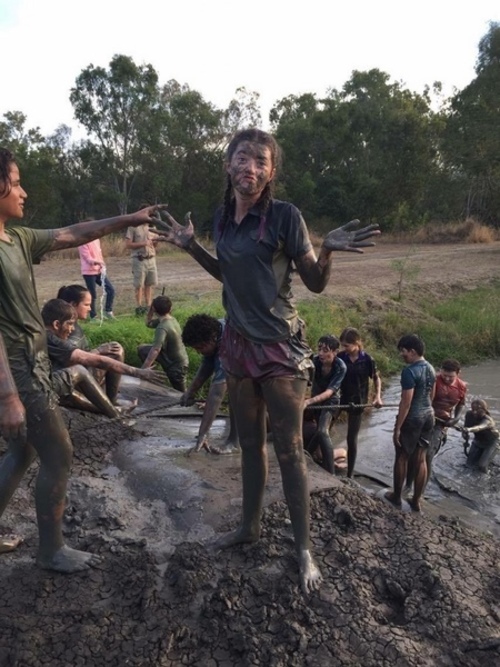
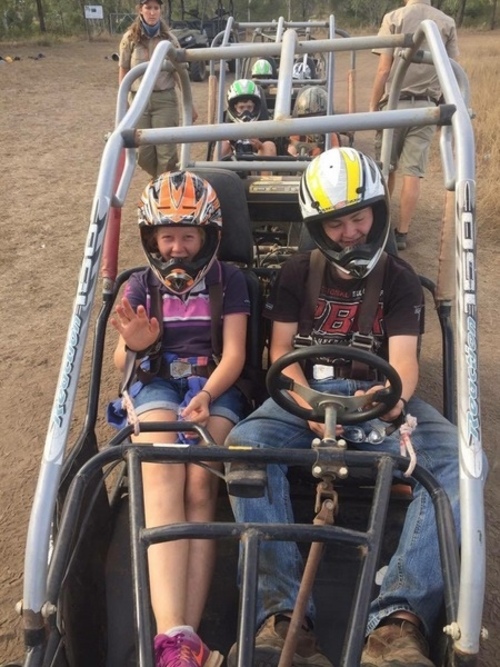
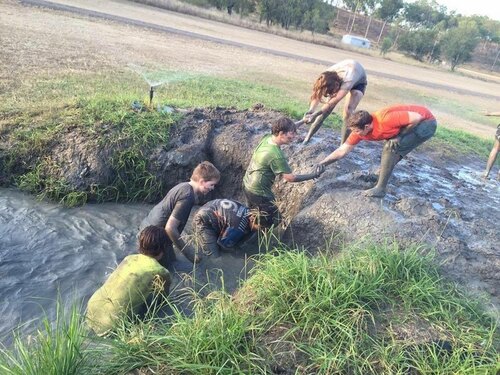
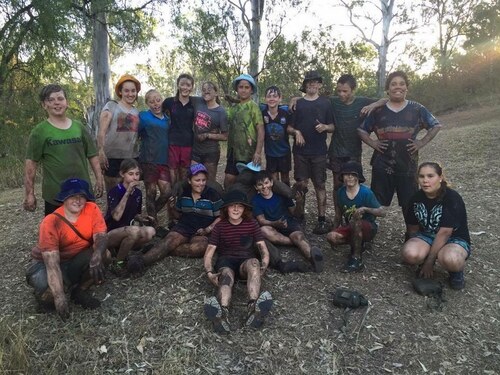
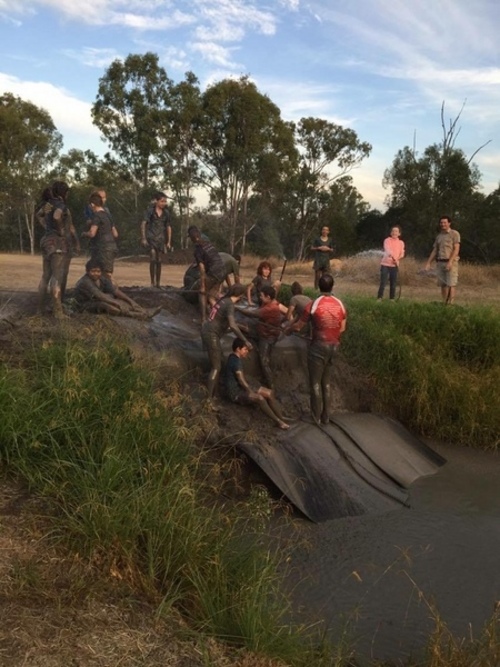
TEENS AND PEER RESSURE
Wanting to be more like your friends is a normal part of being a teenager. Peer influence or peer pressure isn't always a bad thing, but sometimes it might be a concern for you or your child. If this happens, there are things you can do to help manage it.
Peer influence and peer pressure
Peer influence is when you choose to do something you wouldn't otherwise do, because you want to feel accepted and valued by your friends. It isn't just or always about doing something against your will.
You might hear the term 'peer pressure' used a lot. But peer influence is a better way to describe how teenagers' behaviour is shaped by wanting to feel they belong to a group of friends or peers.
Peer pressure or influence can be positive. For example, your child might be influenced to become more assertive, try new activities, or to get more involved with school. But it can be negative too. Some teenagers might choose to try things they normally wouldn't be interested in, such as smoking or taking part in antisocial behaviour.
Peer influence might result in children:
- choosing the same clothes, hairstyle or jewellery as their friends
- listening to the same music or watching the same TV shows as their friends
- changing the way they talk, or the words they use
- doing risky things or breaking rules
- working harder at school, or not working as hard
- dating or taking part in sexual activities
- smoking or using alcohol or other drugs.
Coping well with peer influence is about getting the balance right between being yourself and fitting in with your group.
Some children are more likely to be negatively influenced by peers – for example, children who have poor self-esteem, who feel they have few friends, and who have special needs. These children might feel that the only way they'll be included and accepted in social groups is by taking on the behaviour, attitudes and look of a group.
Helping your child manage peer pressure and peer influence
You might be worried that your child is being influenced too much by their peers, or that they selling out on their values, or yours, to fit in with friends. You might also be concerned that your child won't be able to say no if pressure is applied to try risky things, such as smoking. However, listening to the same music and dressing in the same way as friends doesn't necessary add up to doing the same antisocial or risky things.
Your child might do some things that their friends do, but not other things. You have an influence over your child too, especially over the longer term. If your child has a strong sense of self it's more likely he'll know where to draw the line when it comes to assessing risks.
Here are some ideas to help your child manage peer pressure and peer influence:
- Keep the lines of communication open. You can do this by staying connected to your child. This can help make them feel more comfortable talking to you if feeling swayed to do something they are uncomfortable with.
- Suggest ways to say no. Your child might need to have some face-saving ways to say no if they are feeling pressured to do something they don't want to do. For example, friends might be encouraging the trial of a cigarette. Rather than simply saying 'No, thanks', they could say something like, 'No, it makes my asthma worse', or 'No, I don't like the way it makes me smell'.
- Give teenagers a way out. If your child feels they are in a risky or tricky situation, it might help if they can text or phone you for back-up without worrying you'll be cranky. If your child is embarrassed about having to call you, you could agree on a coded message. For example, they could say that they checking on a sick grandparent, but you'll know that it really means they need a hand.
- Encourage a wide social network. If your child has the chance to develop friendships from many sources, including sport, family activities or clubs, it will mean they have other options and sources of support if a friendship goes wrong.
- Build up your child's sense of self-esteem. This can help them feel more confident to make her own decisions and push back on peer influence.
Until next time,
Jenni
Deputy Principal- Student Services
Positive Behaviour Learning (PBL)
PBL is about preparing students in every way possible for life after school. It is about showing students that our 4 V's and the 4 B's have real world relevance. These are values and beliefs that they will apply when they leave school and pursue their chosen path. Whether that is in an apprenticeship, further education or straight to the work force, we hope that PBL has prepared students for that next step.
At Charleville State High School we expect students to respect themselves, their learning, their teachers and their class mates, as they would their boss and colleagues. We expect students to be organised and have the right equipment in class, as would be expected on a work site. We expect students to be punctual and arrive to class on time, as would be expected in any job.
We hope at home you are seeing the 4 B's and the 4 V's having a positive influence impact on your student/s.
Starbucks – Term 2
Year 7:
Chess Caricato – 110
Year 8:
Amber Hinz – 130
Year 9:
Tahlia Ashford - 90
Year 10:
Josh Dierke - 60
Year 11:
Charlie Aitken – 40
James Springall –
40
Year 12:
Caitlin Doneman - 80
Japanese
This term both the year 7's and 8's have been working very hard to complete a range of language and cultural activities during their Japanese classes.
Year 7's have been learning about food and, in addition to vocabulary and sentence structure, have had the opportunity to make onigiri (rice balls) and build models of traditional Japanese dishes. They are now working towards developing and recording a short script discussing food in a restaurant.
In Year 8, our focus has been on family and friends and students have learned how to introduce and describe people. This has included creating a family scrapbook with descriptions written in both English and Japanese. These students are now getting the chance to create a video introduction about their families in Japanese so we will be practicing recording sound and creating short films.
So far it has been a great term and students have been engaged in their language and cultural studies.
Some Tips For English
Students are engaged from grade 7 – 12 in a range of assessments at the moment. Whether these are written or spoken tasks, there are a number of things students can be doing to support their studies in English.
- Read for pleasure. This one is really simple but very important for students to increase their familiarity with language and vocabulary. It doesn't matter if they want to read magazines, books, information websites, as long as students are exposed to a range of language they will find their own language skills improving.
- Carefully edit work. Whether this is a class activity or an assignment draft, students should always read over their work and check for simple errors. By doing this, they are less likely to continue making the same error in their writing.
- Start early. A lot of students put off their English assignments because they feel they can complete them quickly. While a first draft shouldn't take very long, the revision and editing processes do, so students need to start as soon as they get the task so that they can spend an appropriate amount of time improving their work.
- Ask for help. As with any subject, if students are uncertain about what to do or feel they don't know how to do something, they should always speak with their teacher or HOD to ask for help. Study club runs on Tuesday afternoon and most staff are available to assist students, or they can work out a time before school or lunch to meet and work.
Lending a helping hand for the CWAATSICH Senior Games
Once again Charleville State High School assisted with the running of the CWAATISCH Senior Games held on Friday 27th of May. Senior Games is an opportunity for our older citizens to show some competitive spirit along with teams coming from as far away as Toowoomba in games including ten pin bowls, darts, bean bag throwing and quoits. The increased interest in the event lead to seventeen teams competing. Although the competing teams may sport mostly grey hair, I can say that the spirit was lively.
Our amazing Guidance Officer, Kate Trulson, organised for some of our students to be on hand for the morning. Our students shone and I received some lovely feedback on the day about our polite and helpful students. I was pleased to see our Charleville State High School 4Bs and 4Vs shown by all our students. A big thank you goes to our Dare students and the willing extra volunteers involved, who helped our community and visitors at the Senior Games. Well done!
Cheryl Auchter
Reading Corner
What's Coming Up in the LLI Reading Program?
The focus comprehension strategy this week is questioning. This strategy has been strategically timed with what is happening in the LLI reading program over the coming weeks. It is important for parents/carers to know that your child/ren will be starting to complete their post-testing for this semester. This means that your child will be required to read a small text and answer questions about the text to indicate how much their reading has improved since starting the reading program.
You can expect to receive communication from the school before the end of term on what their new reading level is and whether they will continue in the program next term, or if they have reached the required reading level for their age and therefore will graduate. It is a good idea to talk with your child/ren about skills that they have learnt and if you see improvements in their reading, be sure to comment and praise them for this. The testing is neither long nor scary and practise, practise, practise with you at home will only increase their confidence.
Questioning:
What is it?
Learners pose and answer questions before, during and after reading a text. This helps to clarify meaning and promote deeper understanding of the text. Questions can be generated by the learner, a peer/parent or the teacher.
How does it support reading comprehension?
Questioning not only helps with gaining a deeper understanding of the text, it also helps to engage the reader with the text (Cameron, 2009). Questioning plays an important part in the process of self-monitoring as students ask themselves "Does this make sense?".
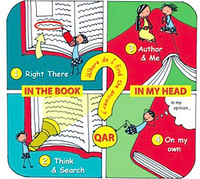
Example Questions/Statements:
- What in the text helped you know that?
- How is this text making you feel? Why is that?
- When you read/viewed/ listened to that text did it remind you of
- anything you know about already? Why did it remind you of that?
- What did the writer of the text mean by …?
Happy reading,
Ange Stirton
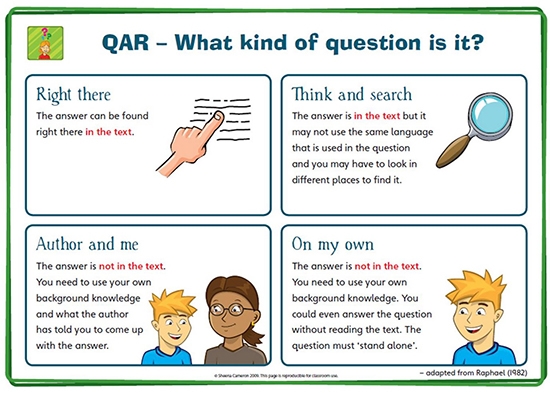
Regional Cross Country
A small group of students from Charleville State High School travelled to St George on Friday the 27th of May to participate in the South West Regional Cross Country Trials. The students were up early to depart from the school bus stop at 4:30am, lucky they were able to sleep on the way down there.
The students were a part of the larger Charleville and District team that comprised students from schools in Charleville, Augathella, Morven and Tambo. All of the students performed well and the results were as follows:
12 Years Gils:
Michelle King - 13th
13 Years Girls:
Sophie
Heinemann - 10th
Olivia Burke - 11th
Makita Lake - 12th
14 Years Girls:
Heidi Mair - 5th
15 Years Girls:
Libby
Usher - 4th
Anastasia O'Neil - 8th
15 Years Boys:
Josh
Dierke - 2nd
Tyson Burke - 7th
Congratulations to all the students on their efforts and to Josh Dierke in particular who qualified for the South West 10-19 Years Cross Country team that will compete at the State Titles in Maryborough on the 17th and 18th of July.
Queensland School Sports – State Netball Championship
Congratulations to Nayiyana Briggs on her outstanding performance in the recent State Netball Championships held in Cairns. Nayiyana was named MVP for the South West team competing in the tournament. She went on to play in the Possibles and Probables game used to select the Queensland Netball Team, however was unsuccessful. While Nayiyana did not achieve this final goal she is to be congratulated on her outstanding achievements through the competition.
Music education and language acquisition
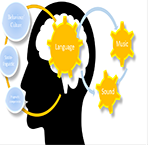
Music and language have co-existed throughout human evolution and are the two ways in which humans communicate and express themselves using sound (Chenâ€Hafteck 1997). Music and society are connected in origin, meaning and value (Regelski, 2005). Cognitive science research suggests that language and music share similar anatomic structures of the brain and its neural function (Engh, 2013). Language and music involve similar mechanisms of the brain to process complex sounds. Thus, music can be a powerful and an effective tool to understand language even in L2 users.
Several studies have established the link between acquisition of language and use of music. Study conducted by Medina (1990) suggest that vocabulary acquisition and recall improves with the use of music and story illustrations. Another study conducted by Patel and Daniele (2003) suggest that there are cultural similarities between the structures of music and language. Further, the results of the two studies conducted by Gregory et al (1996) and Stratton and Zalanowski (1994) provides important clues and information on how music education is relevant and can be used to teach English in L2 learners.
Gregory et al (1996) found that culture may impact on the ways in which listeners respond to music. Their study found that in Western musical cultures, the major mode is associated with feelings of happiness, while the minor mode is associated with feelings of sadness. A study by Stratton & Zalanowski (1994) found that the character of a piece of music can affect the mood of a listener, with melancholy songs increasing feelings of depression. Feelings of depression raise learners' affective filters and this can hinder language acquisition. By selecting songs written in major modes, language teachers may lower affective barriers to learning. According to Regelski (2005), a strong advocate of music education, 'music appreciation and music education makes a noteworthy difference to society and in a student's life'. Music education is 'aesthetic education' and contributes towards aesthetic sensibility, responsiveness or experiences which makes meaningful contribution to society (Regelski, 2005).
Vincent Kwan- Instrumental teacher
Charleville State High School
Charleville Mates Program
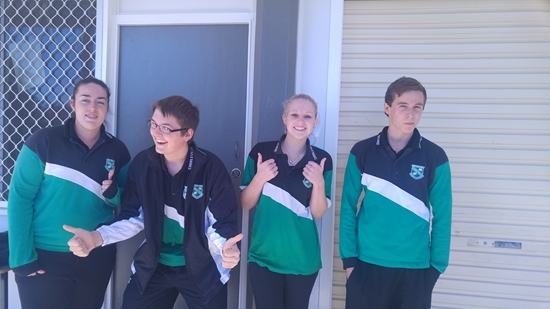
Charleville State High School is excited to announce that we have commenced our new Charleville Mates program in partnership with Charleville State School last week. The program was launched with twelve of our Year 11 students attending the Charleville State School parade, last Monday, where they were introduced to the school community.
Four of our students; Emily, Faith, Jabyn and James; participated in the first round of mentoring, Friday 27th May, where they spent some time in the Year 5/6 Classroom as well as lunch and playtime with the Preps and Year 5/6. Bullrush was a favourite amongst the upper primary school students, while the junior students loved chatting to our high school students, showing them around the school and what they liked to do.
The Charleville Mates program aims to break down some of the barriers that may be faced by students transitioning from upper Primary school to Secondary school. This program also aims to develop a community spirit while enabling our high school students to utilise their leadership skills. This program will continue throughout the rest of the year, and all our students are looking forward to participating in the program and building on the already forming relationships.
Sabrina Goodingham
HOD Junior School / HPE / The Arts / LOTE
Info from the GO
Not Now Not Ever – Putting an end to Domestic & Family Violence
The Not Now Not Ever Campaign Putting an End to Domestic and Family Violence in our Queensland Communities was the highlight for the month of May. Domestic and Family Violence is when one person in a relationship uses violence or abuse to maintain power and control over another person. It causes the person being abused to live in fear. Abuse is not always physical; it can be emotional, verbal, sexual, and financial or involve threats and controlling behaviours. All forms of violence and abuse should be taken seriously and is not acceptable.
All over Queensland, in our workplaces, schools, sporting clubs, neighbours and communities, people are taking up the challenge to put an end to Domestic and Family Violence. Every Queenslander can play a role in changing the culture and attitudes that underpin violence in our community. Whilst most people oppose Domestic and Family Violence, many people still excuse or minimise abuse or think the victim is to blame.
This month, Charleville State High School staff members and students have participated in activities both in school and in the community to raise awareness about Domestic & Family Violence. Staff and students nominated for the Not Now, Not Ever Empowerment Walk-A-Bout received a hat, t-shirt and pedometer and were asked to walk the streets in Charleville to spread information about putting an end to Family & Domestic Violence in our community. The event culminated on Sunday evening where Mrs. Peacock and Miss Trulson represented our school at the awareness evening and candle lighting ceremony for those who have lost their lives to DV. For those who were unable to make this event, Donna Enders has been invited to present staff and students with certificates on assembly next week.
Our year 11 students have also been involved in the education program 'Love Bites' which highlights the importance of building respectful relationships. This program gives students the opportunity to talk about rights and responsibilities within relationships, what is a healthy relationship and where to access further information or services if support is required.
I would like to thanks Donna Enders and Jenny Peacock for engaging our school in this event to help provide our community with information around the Not Now, Now Ever campaign. If you require further information or assistance please contact Donna at Far West Indigenous Family Violence Service on 4654 3815 or visit the premises at 9 Wills Street Charleville.
